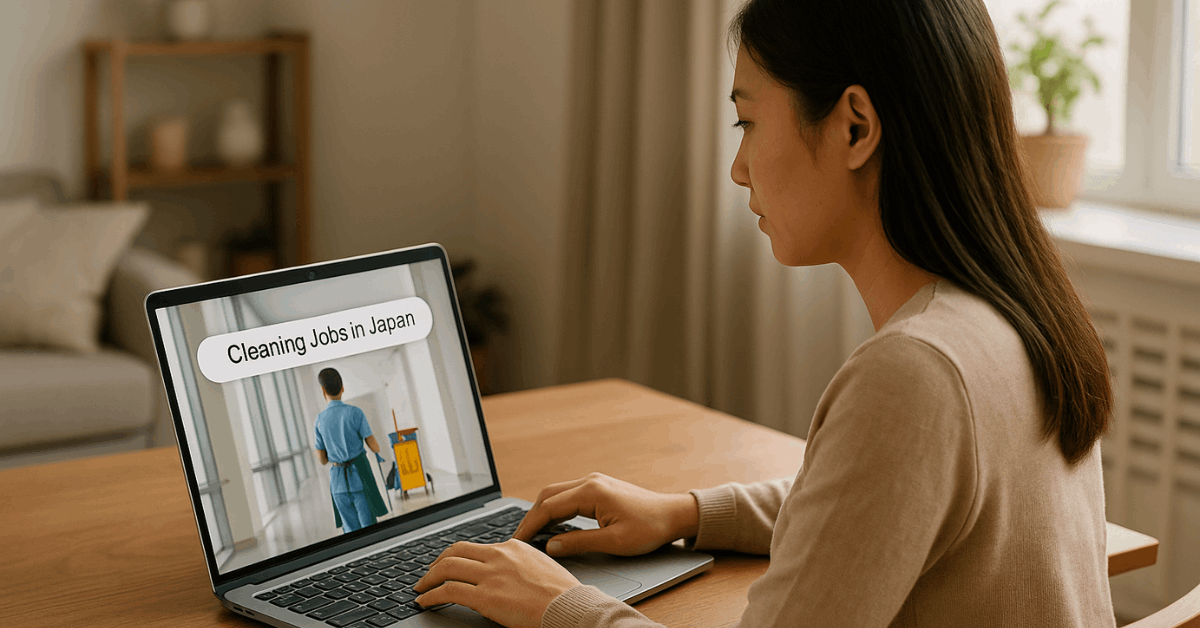Cleaning jobs in Japan are steadily growing in demand. These roles are vital in hotels, offices, factories, and public spaces.
Many opportunities are open to both locals and foreign workers. This article explains the top options, salaries, requirements, and future outlook to guide your career decisions.
Overview of Cleaning Jobs in Japan
Cleaning jobs are an essential part of Japan’s service industry. They exist in many sectors, from hospitality to residential areas.
Employers value dedication and reliability in these roles. Workers are often given stable contracts and flexible schedules.
Why Cleaning Jobs Are in Demand?
Japan’s aging society creates higher demand for facility care. Expanding tourism continues to add opportunities.
Offices and residential complexes also require consistent upkeep. Cultural emphasis on hygiene ensures jobs remain steady.
General Work Environment
Cleaning roles are structured with clear routines. Some involve teamwork, while others are solo tasks. Employers monitor performance closely. Attention to detail is always required.
Types of Cleaning Jobs Available
Cleaning jobs in Japan cover a wide range of workplaces. Each category has specific duties and expectations.
Many workers choose based on schedules and personal strengths. These roles can lead to stable careers.
Hotel and Hospitality Cleaning
Hotels rely heavily on housekeeping staff. Duties include room preparation, linen replacement, and bathroom cleaning.
Workers also maintain lobbies and corridors. Hospitality roles often require interaction with guests.
Office and Commercial Building Cleaning
Office cleaning involves daily janitorial work. Staff clean desks, empty trash bins, and sanitize restrooms.
Larger buildings assign teams to handle multiple floors. Shifts are often early mornings or evenings.
Industrial and Factory Cleaning
Factories demand specialized cleaning. Workers sanitize equipment and keep production areas safe.
Waste management is also included. Jobs may require protective gear and safety training.
Transportation Cleaning (Stations, Airports, Trains)
Public transport facilities require quick cleaning. Bullet trains are cleaned within minutes between trips.

Airports and stations hire large cleaning teams. These jobs are fast-paced with strict schedules.
Residential and Private Homes Cleaning
Residential cleaning focuses on private homes and apartments. Workers may be hired directly or through agencies.
Tasks include vacuuming, dusting, and kitchen cleaning. Seasonal deep cleaning services are also common.
Salary and Benefits of Cleaning Jobs
Wages depend on the type of facility and region. Benefits are provided by most employers.
These jobs offer competitive rates for entry-level work. Pay is higher in urban centers compared to rural areas.
Average Hourly Wages
Pay rates differ across Japan depending on the location. Workers in large cities earn more than those in smaller towns.
- Tokyo: ¥1,100–¥1,300 per hour
- Osaka: ¥1,000–¥1,200 per hour
- Rural areas: ¥900–¥1,100 per hour
Benefits and Perks
Workers receive transportation allowances. Paid leave and health insurance are common.
Overtime and night shifts offer higher pay. Some employers provide uniforms and meals.
Requirements and Qualifications
Cleaning jobs are accessible to most applicants. Employers look for responsible and reliable workers. Some positions require language ability. Physical stamina is always essential.
Basic Requirements
Applicants must be punctual and dependable. Following instructions carefully is expected. Good physical health supports daily tasks. Workers must respect company rules.
Skills That Give You an Advantage
Language skills in Japanese are valuable. Experience in hospitality or cleaning helps.
Some jobs prefer certified sanitation training. Strong communication with supervisors is also beneficial.
Work Schedules and Flexibility
Cleaning work is offered in flexible arrangements. Employers hire for full-time and part-time roles. Workers can choose shifts based on needs. This makes it suitable for students and parents.
Common Shift Patterns
Work schedules are set depending on the facility’s operating hours. Cleaning staff must adapt to these time slots.
- Early morning shifts before office hours
- Evening or night cleaning in public areas
- Weekend and holiday assignments in busy facilities
Flexibility for Students and Foreign Workers
Part-time jobs fit well with student schedules. Foreign workers often choose night shifts.
Employers adjust shifts based on availability. Seasonal work is common in tourism areas.
Opportunities for Foreign Workers
Japan hires many foreign workers in cleaning. Entry barriers are relatively low. Some employers offer language support. Visa options make these jobs accessible.
Visa and Work Permits
Foreign workers need the proper visa to qualify for cleaning jobs. Several options are available based on employment type.
- Specified Skilled Worker (SSW) visa
- Student visa with part-time allowance
- Technical intern programs
Support Systems for Foreign Workers
Employers provide multilingual training. Supervisors help explain instructions. Some companies run cultural orientation programs. Worker support centers offer assistance with housing and legal issues.
Challenges in Cleaning Jobs
Cleaning roles can be demanding. Workers face physical and mental challenges. Understanding these helps prepare better. Awareness prevents frustration later.
Physical Demands
Many jobs require standing long hours. Heavy lifting is sometimes necessary. Fast-paced tasks test stamina. Protective gear is required in factories.
Work Pressure and Standards
Hotels enforce strict inspection standards. Train cleaning has limited time windows.
Supervisors expect quick results. High standards are part of Japanese service culture.
Career Growth and Development
Cleaning work can lead to promotion. Employers recognize loyal and skilled workers. Training is often provided. Long-term employees gain stability.
Opportunities for Advancement
Workers can become team leaders. Supervisors manage larger cleaning teams. Some shift into facility management. Promotions come with higher pay and responsibility.
Long-Term Benefits
Staying in cleaning offers stable employment. Workers improve practical skills. Many transition from part-time to permanent roles. Career growth motivates employees to stay longer.
How to Apply for Cleaning Jobs in Japan?
Applicants have multiple ways to find jobs. Both online and offline options are available. Networking also helps secure roles. Employers prefer simple resumes.
Online Job Platforms
Websites like GaijinPot Jobs, TownWork, and Indeed Japan list openings. These platforms include part-time and full-time offers. Online applications are straightforward. Some listings are in English.

Direct Applications
Hotels and companies accept direct applications. Many post openings on their websites. Staffing agencies also recruit workers. Walk-in applications are sometimes possible.
Tips for a Successful Application
Applying well improves your chances of success. Employers look for reliability and willingness to work flexible shifts.
- Prepare a simple resume in Japanese
- Highlight punctuality and reliability
- Show flexibility with shifts
- Mention past cleaning or hospitality work
Tips to Succeed in Cleaning Jobs
Success depends on work habits and communication. Employers value professional behavior. Good workers receive better treatment. These practices improve job security.
Work Habits
Strong habits make you stand out. They create a good reputation with employers.
- Arrive on time daily
- Follow safety rules carefully
- Maintain a cooperative attitude
- Respect workplace norms
Building Good Communication
Learning basic Japanese phrases helps greatly. Workers should report issues clearly. Teamwork is necessary in large cleaning crews. Positive interaction improves efficiency.
Future Outlook for Cleaning Jobs in Japan
The future of cleaning jobs is promising. Demand will grow in several industries. Technology is also reshaping the sector. This ensures long-term opportunities.
Expected Industry Growth
Hotels and tourism are expanding again. Elderly care facilities need regular cleaning. Office buildings continue to hire staff. Urban centers remain the largest employers.
Impact of Technology
Robotic cleaners are being introduced. Digital scheduling systems are common. Improved sanitation tools increase efficiency. Technology supports workers, not replaces them.
Conclusion – Building a Stable Career in Cleaning
Cleaning jobs in Japan are reliable, diverse, and accessible. They offer stable wages, flexibility, and room for growth.
While physically demanding, these roles reward discipline and dedication. Understanding job types, requirements, and future trends helps you build a stable career in this field.












